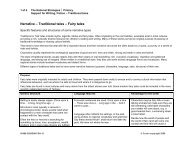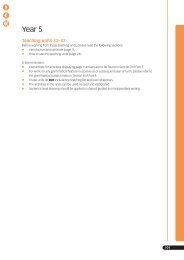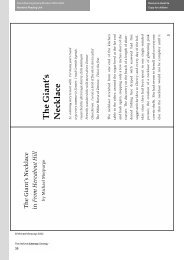Create successful ePaper yourself
Turn your PDF publications into a flip-book with our unique Google optimized e-Paper software.
�<br />
�<br />
�<br />
�<br />
�<br />
�<br />
�<br />
�<br />
�<br />
�<br />
�<br />
�<br />
�<br />
Helping the story progress<br />
Have a working title but be prepared to alter this.<br />
Put numbers on pages; leave spaces between scenes – this helps to give the feeling of accomplishment.<br />
Think of the story or paragraphs as a series of scenes.<br />
If stuck, go back to the plan, imagine a new scene, introduce a new character or event, find something hidden, look<br />
in a pocket, make a discovery.<br />
Collect story triggers – incidents that get scenes going, e.g. a phone rings.<br />
Keep in mind a simple story idea, e.g. two children get lost but find their way home.<br />
If stuck use your whiteboard or notebook to jot ideas, mind map some possibilities.<br />
Collect and use paragraph openings:<br />
Change of place – On the other side of town…<br />
Change of time – The next day…<br />
Change of person – Tom entered the room…<br />
Change of event – At that moment a dog barked…<br />
Change of speaker – ‘Hi,’ said the girl…<br />
Pace yourself as a writer – avoid rushing any part – but do not elaborate too much.<br />
Reread every now and then but don’t let this stop you from driving on to the end.<br />
<strong>Writing</strong> endings<br />
Knowing where your story is going can help you concentrate on the quality of your writing. However, if you near the<br />
end and a better idea comes along – then use it.<br />
Don’t cop out with a tricksy ending, e.g. It was all just a dream.<br />
Distinguish the end of a story from the resolving of the plot. At the end of the story you could:<br />
•<br />
•<br />
•<br />
•<br />
•<br />
describe, or show, the character’s feelings<br />
reflect on events (provide a moral)<br />
look to the future<br />
mention some object or detail from the story<br />
reread the beginning to see if some sort of link can be made or to show how a character has changed.<br />
You can download this flier from the web and adapt it for direct use by children or to create posters for your<br />
writing area.<br />
DfES Publications<br />
Tel 0845 60 222 60<br />
Fax 0845 60 333 60<br />
Textphone 0845 60 555 60<br />
e-mail: dfes@prolog.uk.com<br />
Ref: DfES 0532/2001<br />
© Crown copyright 2001<br />
Produced by the Department for Education and Skills<br />
This document may be reproduced for non-commercial<br />
or training purposes on the condition that the source is<br />
acknowledged.








